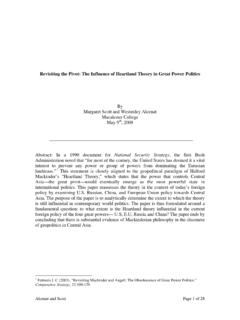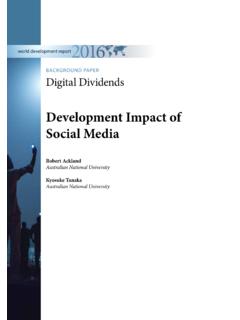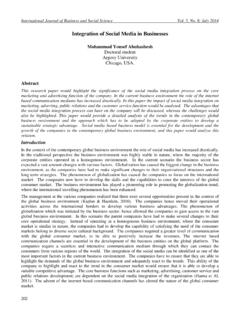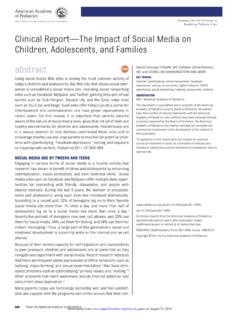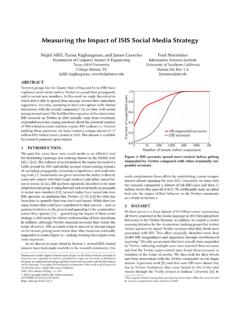Transcription of The Impact of Social Media on Social Movements: The New ...
1 The Impact of Social Media on Social Movements: The New Opportunity and Mobilizing Structure Amandha Rohr Lopes Creighton University 4/1/2014 2 The Impact of Social Media on Social Movements: The New Opportunity and Mobilizing Structure Amandha Rohr Lopes This paper seeks to explain and test the formation process of Social movements by addressing two overarching interrelated factors: opportunity structures and mobilizing structures. I hypothesize that Social movements are caused by opportunity structures such as economic, institutional, and Social contexts of a country conditioned by its access to Social Media .
2 Social movements are not created by a single variable but rather by a set of variables that create an interaction effect. Discovering ways to mass organize is as essential for the occurrence of Social movements as the grievances that make people want to organize in the first place. The introduction of Social Media into the discussion is thought to have completely changed the way people are able to organize. In order to test my hypothesis, I use data from a number of different sources for all countries in 2008 -2012.
3 Research Question Scholars have long considered under what conditions Social movements are most likely to emerge. The communication revolution brought about from the rapid emergence of Social Media has led scholars to shift the direction of such questions to the Impact of Social Media in Social movements. Social movements have been implemented in many different forms and on different levels in order to transform societies. New studies are now looking at Social Media as a tool in shaping Social movements agendas and aiding collective action both online and offline at the local or global level.
4 The most fascinating ability of this new tool is that Social Media enables ordinary citizens to connect and organize themselves with little to no costs, and the world to bear witness. Social Media websites such as Facebook, Twitter, YouTube, and the various online blogs have arguably given a voice to individuals that otherwise would not be heard. The new wave of contention inspired by the Arab Spring that spread all over the world, even to places like Venezuela more recently, has again stimulated the study of contentious politics.
5 This new wave of protests is bringing to focus the role of Social Media particularly Facebook as a main force behind recent popular movements (Lim 3 2012). While much attention has been paid to why a group of individuals decide to mobilize, many scholars have concluded that grievances alone are not enough to create movements (Buechler 2000). Recent literature has created models that combine these underlying motives for contention with Social networks as the basis for movement recruitment and the path to popular mobilization (Diani & McAdam 2003).
6 While there are studies on the connection between Social Media and mobilization, none have effectively merged an analysis of these forms of Social action with existing theories of Social movements and contentious politics. This study seeks to focus on Social Media as the alternative tool to the common way of movement recruitment and collective action. It also attempts to understand how ordinary citizens fueled by grievances and a desire for change come together online to challenge the status quo. The German Sociologist, Lorenz von Stein, first introduced the term Social movement into scholarly discourse in the 1950 s (Tilly 2004).
7 It conveyed the idea of a continuous, unitary process by which the whole working class gained self-consciousness and power (Tilly 2004). Later, some defined it as collective challenges by people with common purposes and solidarity in sustained interactions with elites, opponents and authorities (Tarrow 1994). One of the most widely accepted definitions is that of Charles Tilly (2004), who defines Social movements as a series of contentious performances, displays and campaigns by which ordinary people make collective claims on others.
8 For this study, I choose to use a definition very similar to Tilly s where a Social movement is defined as conscious, concerted, and sustained efforts by ordinary people to change some aspect of their society by using extra- institutional means (Goodwin & Jasper 2003). Such movements can be important vehicles for Social and political change, and have the potential to transform the systems of institutionalized politics in which they occur (McAdam 2001). Social movements can give us an insight into human action and why people voluntarily cooperate and mobilize (Cameron 1974).
9 They can also have implications in the spread of democracy, or regime change (Goodwin & Jasper 2003). While Social movements are a worldwide phenomenon, there is much variation in its occurrence. This particular study will focus on Social movements worldwide from 2008 to 2012 to answer the question of under what conditions are Social movements most likely to emerge by using Social Media as the explanatory and intervening variable of 4 interest. I hypothesize that a Social movement is the effect of opportunity structures such as the economic, institutional, and Social contexts of a country conditioned by its access to Social Media .
10 The opportunity structures take into consideration the grievances that drive a Social movement . These grievances can be derived from a change or deterioration of Social , political, and or economic conditions. The mobilizing structure is the Social networks and all resources necessary for popular mobilization, which in this case consists of Social Media as the fastest and cheapest way to mobilize. Both aspects are necessary to the emergence of Social movements (Stark 2010). In the following sections of this paper, I identify and discuss common approaches and hypotheses on Social movement in the literature, as well as explain and test my own hypotheses.


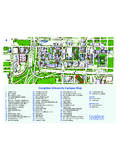



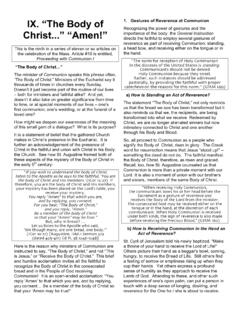
![Hearing protection [Read-Only] - Creighton University](/cache/preview/9/6/e/e/8/f/d/c/thumb-96ee8fdc2111eb2b05b9b613f7af1575.jpg)
